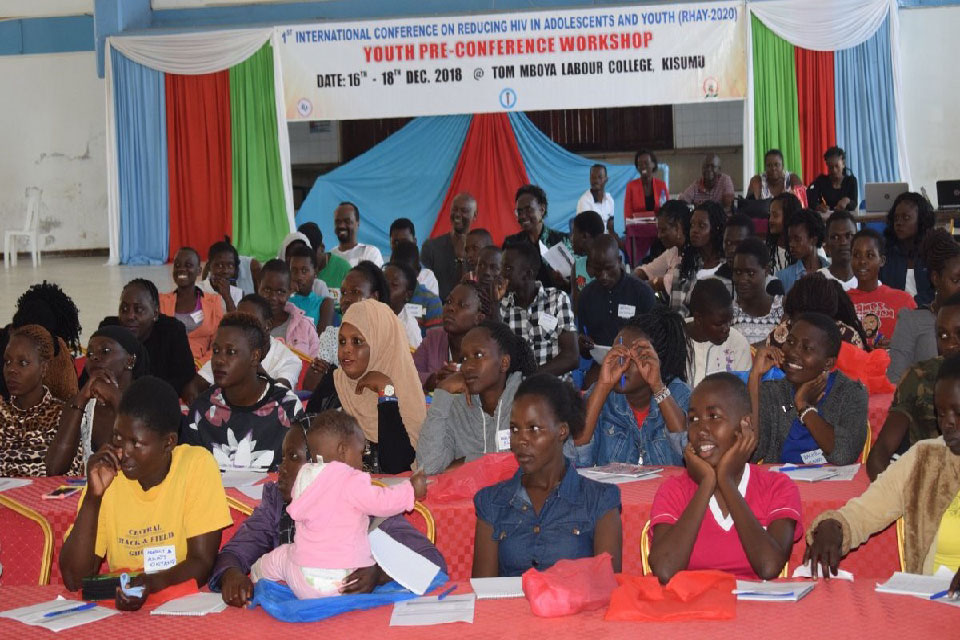Share this
Although the overall number of HIV-related deaths has been decreasing since the peak in 2006, estimates suggest that this is not yet the case among adolescents. According to a World Health Organization (WHO) report released last year, indicate that in 2018, about 1.6 million [1.1 million-2.3 million] adolescents between the ages of 10 and 19 were living with HIV worldwide. Adolescents account for about 4 percent of all people living with HIV and about 11 percent of new adult HIV infections. The regions with the highest numbers of HIV-positive adolescents are sub-Saharan Africa and South Asia. Of the 1.6 million adolescents living with HIV, about 1.5 million [970,000-2.0 million] (89 percent) live in sub-Saharan Africa.
Some most recent data indicate that only 19 percent of adolescent girls and 14 percent of adolescent boys aged 15-19 in Eastern and Southern Africa – the region most affected by HIV – have been tested for HIV in the past 12 months and received the result of the last test.
What these sets of data show are that, while the world has made significant steps in combating HIV, these steps have not been as successful among young people and adolescents. Several conferences, workshops, and seminars have been held by health practitioners, behavioral scientists, and numerous stakeholders with the aim of finding out why this trend has been this difficult to defeat.
Given, there have been some groundbreaking ideas that have added value to the fight against HIV among this segment of the global population. What’s of concern today is that these ideas have not been as successful, and perhaps as groundbreaking, as they were initially thought-out to be.
So, what has been missing?
There is a need for a paradigm shift in how solutions to this problem if sought – inclusion. There is a growing conversation about the need to include young people and adolescents in finding solutions. There is a need to understand from their own perspective why the global strategies advanced by various stakeholders in the fight against HIV are not as effective among this segment of the global population.
This goes beyond one or two of them being given the podium to tell their stories in conferences, or where only a pre-conference session is dedicated to them, or where they sit at a youth corner in the community village, talking among themselves because they find it challenging to navigate the highly scientific concurrent sessions or understand the research jargon used during presentations in such conferences.
So there is an urgent need to design conferences that are more realistic to the ways young people interact with information. This includes conference setups that are friendlier to them, having them as the center of the conversation – listening to their voices beyond their personal stories. Paying attention to their suggestions on how to solve their problems better, building their capacity to be able to steer the fight against HIV in their own segment, in the spirit of ‘nothing for us without us.’
It is against this backdrop that Impact Research and Development Organization is hosting the first-ever conference on International Conference on Reducing HIV in Adolescents and Youth (RHAY) in Eastern & Southern Africa. The theme for this conference will aptly be; ‘Beyond the Rhetoric: Engaging adolescents and young people in ending HIV.’
The conference will be held at the Grand Royal Swiss Hotel, in Kisumu, Kenya from 14th – 19th June 2020. It will bring on board over 600 young and adolescent participants, not just to fill the numbers, but to be intentionally engaged in planning the conference, facilitating sessions, and selections of mentors among other roles.
How can you participate?
- Submission of abstracts
To make the dream of this conference a reality, the RHAY Secretariat is calling upon young people and adolescents from all over Eastern and Southern Africa to submit abstracts for the conference. The deadline for submission of abstracts is 28th February 2020.
This does not, however, mean that if you are beyond the age of 24 or are living outside Eastern or Southern Africa you cannot participate. You can mentor a young person or adolescent living in Eastern or Southern Africa to create abstracts and submit them before the deadline. You can also submit your own abstracts as long as they are based on data collected from young people and adolescents living in Eastern or Southern Africa.
To submit your abstracts, visit https://rhayconference.com/submission/abstracts.
- Submission of proposals
However, there will be a special category for the ‘30 under 30 awards’ where 30 most innovative ideas on HIV prevention among young people and adolescents submitted in proposals will receive funding worth USD 5,000. To be eligible for this award, those submitting proposals must be aged 30 or bellow.
To submit proposals, visit https://rhayconference.com/submission/proposals.
- Essay writing competition
Because abstracts and proposals do not really cater for the participation of all cadres of young people, a lot of whom are still in elementary schools or high schools, there will be a submission of ideas in the form of essays for young learners who want to add their voices to this cause. The essays will be scrutinized and amazing ideas coming out of that will be tweaked into abstracts and proposals.
- Sharing of best practices
There will be a session that is open for representatives from various countries and organizations working with young people and adolescents who want to showcase the ‘best practices’ that have worked well for them when it comes to the prevention of HIV. These will be held between 08:00 hours and 18:00 hours on Sunday and Monday, June 14-15, 2020, and between 07:30-08:30 and 17:00-18:00 hours Tuesday to Thursday, June 16-18, 2020.
To submit a concept note for consideration, visit: https://rhayconference.com/submission/best-practices





